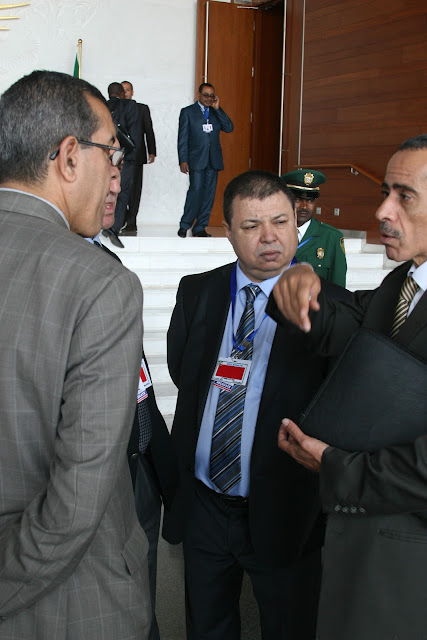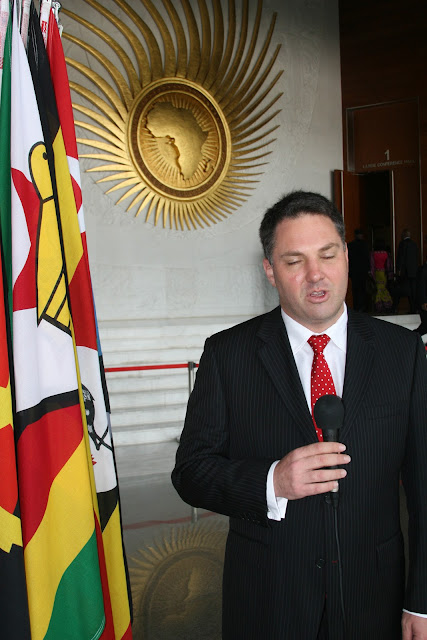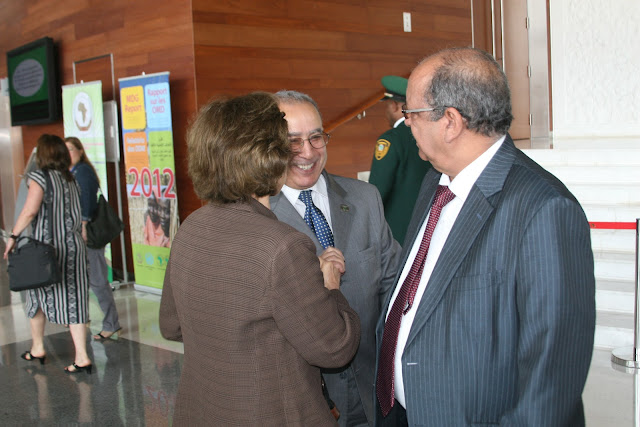UNION AFRICAINE |
||
|
|
UNIÃO AFRICANA |
|
Addis Ababa, Ethiopia P. O. Box 3243 Telephone: +251 11 551 7700 / +251 11 518 25 58/ Ext 2558Web site: www. au.int.org |
||
DIRECTORATE
OF INFORMATION AND COMMUNICATION
21st Ordinary Session of the Executive Council opens on signs of unity
and collective interest for Africa
Development
priority areas highlighted by Dr Ping
The period under review was marked by
institutional crises but this has not stopped the Commission from pursuing
other priorities. Chairperson Ping cited as an example, the implementation of
the Programme for Infrastructure Development in Africa (PIDA) through a roadmap
and Priority Action Plan for 2020. In the area of education, the Chairperson
announced the launch in September this year, of courses in three of the five
thematic Pan African University campuses situated in Nigeria, Cameroon and
Kenya while the fourth university located in Algeria will welcome its first
students in 2013.
Meanwhile the Commission, Dr. Ping
underlined, has continued its efforts to strengthen the position and interests
of Africa in the international arena and has consolidated strategic
partnerships with a view to enhance the development of the continent. Many
crucial activities to fulfill the vision of the AU are being implemented, such
as the theme of the summit "Promoting intra-African trade" and the
efforts aimed at establishing a continental free trade area by 2017.
Chairperson Ping reminded the Council of the “necessity to
find a lasting solution to the problem of funding of the African Union and its
activities. This, he said, will help enhance the sustainability of the actions
of the organisation, asserting the credibility of the leadership
and the African ownership of its initiatives.
He said Africa has all the assets to be successful, stressing
that the manufactured goods in Africa already account for 46% of intra-African
trade and the that the infrastructure is of a higher standard than that of some
regional sectors such as Mercosur, an economic and political agreement among
three South American states.
The opening ceremony of the Executive Council was marked by a moment of silence in memory of the late Dr. Archigramm Bingu Wa Mutharika, President of the Republic of Malawi, and Mr. Ahmed Ben Bella, first President of the People's Democratic Republic of Algeria.
The 21st Ordinary Session of the Executive
Council ends on 13 July 2012. Its report will be submitted to the 19th Ordinary
Session of the Assembly of Heads of State and Government of the AU for
adoption.
IMAGES ROM THE 19TH EXTRAORDINARY SESSION OF AU HEADS OF STATES SUMMIT IN ADDIS ABABA TODAYEncouraging developments as Africa looks to establish Continental Free Trade Area
Addis Ababa, 13 July 2012 (ECA) -As preparations for next week's launch of the fifth edition of Assessing Regional Integration in Africa (ARIA V) get underway in Addis Ababa, the Heads of States Summit of the African Union is once again tackling the theme, Boosting intra-African Trade from 9-16 July 2012. ARIA V is published jointly by the Economic Commission for Africa (ECA), the African Union Commission (AUC) and the African Development Bank (AfDB); and the fifth edition of the report inquires into Africa's Continental Free Trade Area (CFTA). The three institutions affirm that its findings come at a time of renewed political commitment to accelerate the pace of regional integration in Africa as seen in many positive developments, such as steps towards a favorable environment to create the free movement of factors of production.
According to Abdoulie Janneh, Under Secretary-General and ECA Executive Secretary, the case for boosting intra-Africa trade was made at the January Summit of the Heads of States and remains on the agenda of this month’s Assembly of Heads of State and Government. He told the 21st Ordinary Session of the African Union Executive Council that legitimate observations were made in January, about the limited infrastructure and diversity of goods to allow for successful take-off of the Continental Free Trade Area (CFTA). He informed the gathering that ECA has examined these concerns and found that manufactured goods make up 46% of intra-Africa trade as compared with 10% for agricultural goods. “Moreover," said Janneh, "we also found that the degree of infrastructural development was not much higher in a comparable group like MERCOSUR in Latin America when it took off."
Mr. Janneh took the opportunity to re-affirm that ECA will accompany the CFTA process through the auspices of the African Trade Policy Centre, which is supported by Canada. “Specifically, ATPC will draw its future priorities from the mandate given to the AUC and ECA to advance the continental trade agenda.”
He pointed out that boosting intra-Africa trade also depends on the provision of infrastructure and expressed the hope that the G20 initiative on infrastructure financing will gain further traction and that the multilateral finance institutions, particularly the African Development Bank and World Bank will strengthen their instruments for financing regional infrastructure projects. “Such investments will also improve accessibility for humanitarian agencies, which continue to play a crucial role in the continent,” he said.
The overall objective of ARIA V was to contribute analytical insights to shape the debate and the move towards fast-tracking the establishment of a Continental Free Trade Area (CFTA) through the removal of outstanding obstacles to trade, including barriers to the free movement of people, investments and factors of production across Africa.
The report is complemented by a number of related products, including a mobile application, a film on intra-African trade, a proposed e-learning platform and a new ECA knowledge online network.
























